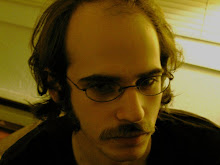
about now, but I'm on a really big history kick.
In some ways, Batman: Arkham Asylum combines story and gameplay better than almost any game I've seen. Rather than come up with my own witty retort for why this is, I'll do the lazy thing and quote Dan Whitehead who'd already said it best:
"By placing the game in the realistically restricted confines of Arkham, and by having the unpredictable Joker as the antagonist, the story doesn't really have to stretch too much to accommodate the requirements of a videogame. Joker is playing with Batman, after all, and so it makes sense that he'll be opening up new areas only when you've performed specific tasks."
In some ways this is true. If you play the game straight through, you'll experience this seamless mix of story and gameplay. However, the game sort of dissuades you from playing this way with its host of collectibles and secrets.
I found myself scanning the room trying to solve the Riddler's challenges and find his hidden trophies, then thinking, "Wait a second. Shouldn't I be trying to rescue Commissioner Gordon?" If you're trying to take the story seriously, it doesn't make sense that Batman would be going off on all these archeological tangents.
At the same time, I'm not criticizing their existence either, because they're both fun in their own right, and help highlight the often brilliant level design as well as ensure that the player catch all the hidden details that go a long way towards fleshing out the game world.
But I find that these are two completely different ways of playing the game. Exploring is fun. The story is compelling. They're just at odds with one another, and I'm not sure what a designer could do to fix that. As a result, the way I'm trying to play is to ignore all the collectibles and respect the story and the sense of urgency that it conveys. Then once I've beaten the game, I'd like to go back and search for all the hidden goodies. That way I can put the plot on hold and think of it like an extra on a DVD where you get to appreciate all the details you didn't have time to catch the first time around.
Though my OCD does tend to make me want to scavenge every nook and cranny of each area when I enter it, but that's my problem. Not the game's. And I'm trying to fight it. Though I'm curious why I even care to find all these collectibles when I know I'll go back for them later anyway, as they break the illusion of being Batman hot on the Joker's trail. Is it due to year's worth of playing games where the plots are negligible, so I don't mind breaking them (Metroid certainly comes to mind here)? Is it because I dread the thought of having to retread old ground for something I've missed? I'm curious what other people's reactions have been to this and whether they notice or care that seeking out these extra challenges make no sense in the game's narrative. And how do you compromise these two divergent aspects of story and game? Perhaps only have the collectibles appear as a bonus mode post beating the game, so that they can't get in the way the first time through? Just a thought.

